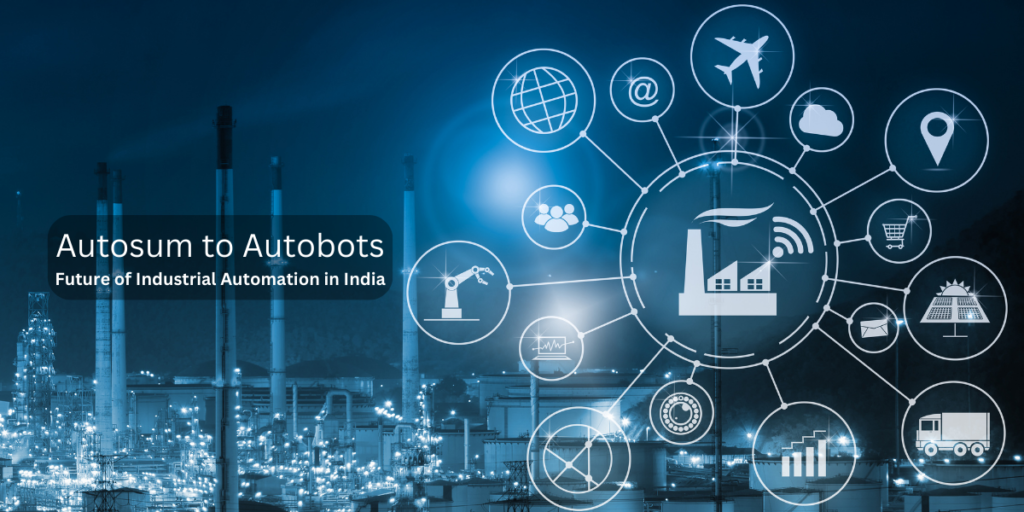Table of Contents
Industrial Automation! Do we really recognize enough?
Is the level of automation in our daily life also present in industrial automation? No is the answer. The automation advancement we see in other areas of daily life is yet to come in industrial automation. What about India? India too. Despite producing some good models of industrial automation, India’s industrial automation is still an undiscovered treasure.
Have a look around you. We nowadays perform a number of tasks with the help of Google Assistant. We are familiar with smart home appliances being controlled by Alexa or Google Home commands. We experienced how fast the payment and receipt systems are efficiently working with online shopping and online taxi services. To make it even more simpler, we do calculations in MS Excel and Google Sheets just by clicking the bottom right corner of a cell with a formula applied and dragging through the following cells. We use many automation tools in our daily life with or without our knowledge. Automation is everywhere.
So we already know how much the concept of automation is helping us in daily life and so the fact that our industries are under-automated till date, the scope of industrial automation as a career is already high.
Automation: Getting as smart as lazy!
On a lighter note, automation can be defined as the process of a few smart minds making some hard working engineers write programs to move machines or machine parts on its own and letting the rest of the world be lazy. Indeed this can be a layman’s definition of automation. Also we are in a world where automation has reached new heights and still expanding its domain along with the mighty weapon of data. When data science and automation join hands, it forms the base of machine learning. So industrial automation is not just limited to conventional industries. It extends straight up to the limitless world of artificial intelligence.
Keeping the layman’s definition aside, industrial automation is defined as utilizing computer controlled systems with well defined programs to handle different processes, machine systems, machines and machine parts in industry. Indeed automation replaces humans with machines, yet undoubtedly it is one of the greatest ongoing revolutions in the industrial world. Not to forget the immense amount of ease in workplaces brought by industrial automation.
India.. India.. So many possibilities..
So no matter whatever things are happening worldwide in automation technology, we are more interested in knowing where India is placed in that technology map. At the end of the day, that is what a ‘scope’ means to most of the Indians. Not forgetting the migrating few. But compared to the number of qualified citizens within India, the migrating population is negligible. At least for now.
Well, coming to the point, industrial automation in India has come a long way since the last two decades. However the area explored is niche. It is limited to very few systems such as retrieval systems, conveyor systems, mobile robotics and other factory/warehouse automation systems along with their corresponding field devices. The industrial control systems in India include but are not limited to Distributed Control System (DCS), Programmable Logic Controllers (PLC), Supervisory Control and Data Acquisition (SCADA) and Human-Machine Interface (HMI).
About the market players, the Indian industrial automation market is moderately competitive. In the order of business major players in the Indian industrial automation sector are,
- BHEL (Bharat Heavy Electricals Limited)
- ABB Limited
- Grey Orange Pvt. Ltd.
- Kardex India Storage Solutions Pvt. Ltd
- Mitsubishi Electric
From the list above don’t assume that industrial automation is not just limited to a few sectors in India. Industrial automation has application in every common industrial sector in India including oil and gas, petrochemical energy, automotive, textiles, power generation, food and beverage, pharmaceuticals and agriculture. The penetration of industrial automation in these sectors is very less. There are very good models of industrial automation in each of the above mentioned sectors. But they are very few in numbers.
India is marching on to the fourth industrial revolution. Industrial automation professionals and students have a reason to cheer about this is that a major feature of the fourth industrial revolution in India is the widespread automation implementation in the industries across different sectors.
How.. When.. Where.. Why.. to Start Automation?
If you are planning to start a career in industrial automation, the right time is now. Automation was not very common among Indian industries. Not only in India, around the world, many industries were reluctant to automation as they were finding it difficult to embrace the change. They remained in the comfort zone, even though it cost them a considerable amount of manpower. Then the COVID-19 happened.
Indeed, COVID-19 was a huge blow for mankind. However it turned out to be a boon for the automation industry as more and more industries broke their wall of reluctance and started to take the route of the next big revolution of industrial automation. The importance of the ability to monitor and manipulate a running system remotely becomes evident with the complete or partial closure of many industries for months. However all these circumstances lead to a new revolution.
This sudden boom created a huge demand for automation professionals in all levels. Industrial automation, already being an evergreen field with limitless possibilities, now turned one of the hottest choices for a career.
Remote accessibility is the key feature of a next generation industry. Industrial automation professionals are already in the forefront to make every industry more remotely accessible to the people running them. So, for being the torchbearer for the next industrial revolution in India, being an industrial automation professional is the best option.
Note the point!
Every machine now has a PLC and so it already has one or more IP addresses. A day is coming soon every light bulb is going to have an IP address. The PLC is HMI communication taking place through various new connectivity systems rather than sticking on to traditional series connection. Data from a machine itself helps to predict results and improve the system as such in future. So data handling integration is key in modern day industrial automation. Learning and updating is the way to approach industrial automation as a career.

